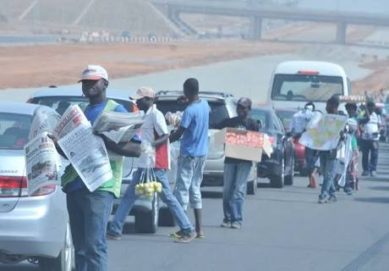Economic Issues
The Age of the Shadow Economy Is Here -By Chris Ngwodo


For decades, successive Nigerian governments have sermonised about the need to diversify the economy, moving it away from dependence on crude oil exports. For years, this has remained a foul-weather aspiration rather than a policy imperative. Now, plunging global oil prices have triggered a crisis of public finances, and undermined fiscal assumptions for national budgeting. The stone-cold reality is that the Nigerian state is broke, with governments at all levels struggling to finance capital projects and sustain recurrent expenditure. However, a season of adversity is also a season of opportunity. If ever there was a time to wean Nigeria off oil, this is it.
To begin with, we must change the way we think about the economy. An economy is not about crude oil or solid minerals; it is about people – their skills, hopes and aspirations. To truly diversify the economy is to mobilise Nigerians as Nigeria’s most important economic resource. It is to leverage their dreams and ambitions for national growth.
Secondly, oil is actually Nigeria’s secondary income source. Her real mainstay is her informal economy – a vast unmapped matrix of productivity that includes services, trading, small and medium scale manufacturing. This is a virtual shadow economy that sustains Nigeria during seasons of adversity occasioned by oil price volatility. This sector provides 80 to 90 percent of the economic needs of the majority of the population, supplying everything from household appliances, plumbing, healthcare, recreation, automobile servicing and consumables.
If Nigeria were as absolutely dependent on oil as is popularly believed, she would have long folded up. The inability of many state governments to pay their civil servants over long stretches would have ignited massive social unrest. But the underrated shadow economy has long served as a buffer between governmental failure and massive social upheaval. Oil rents matter far more to an elite minority than to the Nigerian people. According to the World Bank, just one percent of the population benefits from 80 percent of the nation’s oil wealth.
Oil revenues matter but the undocumented labours of ordinary Nigerians are far more significant in sustaining Nigeria Inc. Declining oil prices have occasioned panicked hand-wringing and gnashing of teeth in official circles. This suggests a lack of foresight by people who should presumably know better. An economy built on a volatile commodity increasingly susceptible to technological disruption (shale oil, alternative renewable energy, etc.) was always unsustainable. We must avoid talking ourselves into recessionary hysteria when we should be thinking outside the box.
In her outstanding book, The Bright Continent, Nigerian-American journalist Dayo Olopade contends that the undue international focus on African governments and formal institutions distracts attention from the vibrancy, authenticity and economic significance of interactions between individuals and decentralised groups. This “formality bias” ignores the dynamism of the informal sector which often achieves more, better, or faster results. The histrionics and hysterics surrounding oil exemplify this formality bias. In The Mystery of Capital, Hernan De Soto argued that the key to instigating economic growth in poor countries is to release the vast lodes of untapped wealth that remain trapped in informal and pre-modern proprietary structures. Nigeria’s shadow economy represents a similar challenge.
In his book, Omoluwabi 2.0: A Code of Transformation in 21st Century Nigeria, Adewale Ajadi identifies “the fundamental fault lines of Nigerian existence” as “the structural chasm between the formal and the informal” as a result of which impressive macroeconomic growth statistics have no impact on those who operate in the shadow economy. The gap between the informal and the formal is why traders in our markets, despite their phenomenal retail volumes, cannot chart a course of growth that will eventually get them listed on the Nigerian stock exchange.
“The transformative challenge,” Ajadi writes, “is whether the incredibly large, super dynamic and ever-present informal sectors, from the bukka to the vulcaniser and tailor, are integrated into the formal economic sector through the provision of microcredit or the establishment of other institutional support systems.” Over 60 percent of Nigeria’s GDP is domiciled in this dimension – unofficial, unmapped and unrecorded. According to the Institute for Liberty and Democracy, nearly 94 percent of businesses in Lagos are in the $50 billion-informal sector which exceeds total annual foreign aid and foreign investment. This may even be a conservative figure. Places like Onitsha, Aba and Kano have equally buoyant informal economies.
To bring the shadow economy into the light, we must graft banking, venture capital, microcredit, insurance and infrastructure unto it. It also means eliminating the bottlenecks that subvert our natural entrepreneurial genius. There is no reason why with a digitised process, we cannot ensure that new businesses are registered within a working day. Digitising and simplifying systems and processes, making things easier for those seeking to make an honest living, should be the overriding orientation of governance.
The vast size of the informal sector is a sign of economic repression. Inebriated by easy oil rents and its accompanying subsidised sloth, state governments and local governments have, for years, attacked the productive hubs of the shadow economy with all kinds of predatory taxes, extortionate levies, hare-brained gentrification and urban renewal schemes. Improving the scenery for the rich seems more important than empowering the poor, working and entrepreneurial classes. Doing business in Nigeria is suffocated by unnecessary red tape, a predatory bureaucracy, and non-availability of favourable institutional credit. Consequently, entrepreneurs looking to make an honest living typically go underground.
Thinking innovatively about our present debacle requires us to see our economic environment in a new light. Think of mechanic villages and computer villages (where software and hardware techies operate) as organically-evolved entrepreneurial clusters and tech hubs. Think of Alaba, Idumota, and Iweka Road, Onitsha as industrial and marketing hubs of Nigeria’s massive entertainment industry. Think of business centres as virtual offices and our great open air markets built on adaptable supply chains and social networks as dynamic wholesale and retail hubs. Witness our motor parks where competition thrives alongside anti-trust codes to prevent unfair advantage.
To bring the shadow economy into the light, we must graft banking, venture capital, microcredit, insurance and infrastructure unto it. It also means eliminating the bottlenecks that subvert our natural entrepreneurial genius. There is no reason why with a digitised process, we cannot ensure that new businesses are registered within a working day. Digitising and simplifying systems and processes, making things easier for those seeking to make an honest living, should be the overriding orientation of governance.
Liberating the shadow economy would mean ushering our great markets into higher standards of cleanliness, organisation and quality-control. It would mean tailoring infrastructural investments to overlay and support the shadow economy’s value chains. For example, high speed rail lines between the food basket of the far North and the Middle Belt and urban centres would drastically shrink supply timelines, avoid wastage of produce and ultimately lower cost of food in urban markets while injecting vital liquidity into farming communities. (Investments in storage infrastructure and technical assistance and capacity building for agrarian communities would also greatly aid this cause.)
Liberating the shadow economy would mean opening up the South-East with maritime and allied infrastructure, giving the manufacturing hubs of Aba and Nnewi better access to internal and external markets. This would also alleviate the overconcentration of economic activities in Lagos, a densely-populated, infrastructure-deficient megacity, which as Nigeria’s main maritime terminal is vulnerable to external subversion. Creating other commercial nerve centres is not just an economic necessity; it is a national security imperative.
Investments in the power sector could highlight defacto industrial and economic clusters, tech hubs and commercial districts and reduce operating costs borne by these businesses. Enabling the shadow economy means hitching our polytechnics, vocational institutes and colleges of science and technology to the apprenticeship programmes that undergird the real expertise in the informal sector, thereby formally certifying and dignifying the sector’s value-adding actors, and promoting quality assurance, parity of esteem and dignity of labour in a society that erroneously glorifies sedentary white collar idleness over real problem-solving. Enabling the informal sector is the best way to empower Nigeria’s teeming young legions.
An obvious question is how a broke government can finance these capital investments. Crude oil and natural gas account for 90 percent of our exports and 75 percent of all government revenues but they account for just 11 percent of the national GDP. Services, agriculture, industry and construction actually contribute more to the nation’s GDP than oil and gas. Thus, it can be argued that the economy is already diversified to an extent; what remains undiversified is our revenue base. The economist Tope Fasua has highlighted the vast dimensions of taxable but untaxed wealth that could alternatively finance the national economy. He advocates taxes on capital gains, luxury goods, cars and inheritances in addition to fines and levies to boost public revenue.
Taxation is not just a fiscal instrument; it is part of a social contract and, crucially, Fasua highlights the role of taxation as an instrument of socio-economic re-engineering. A fair tax regime would make demands on all of us but it must not cripple the poor, the working class and the shadow economy’s entrepreneurs. Rather, it must address raging inequality by redistributing wealth misappropriated through decades of rent-seeking cronyism and kleptocracy, and fund a democratised prosperity. It must domesticate rogue elites whose consumptive appetites have contributed largely to the squandering of our patrimony. Additionally, a tax-paying citizenry would be uniquely incentivised to hold governments accountable.
Finally, diversifying the economy requires the reform of a dysfunctional political architecture that is practically anti-growth. It demands devolution of powers and responsibilities away from the disproportionately empowered central government to state and municipal authorities. The overbearing federal presence in the economy (as mandated by the exclusive legislative list) suffocates entrepreneurial initiative. Empowering the informal sector means liberating the municipal tier of government which is closest to it. Local governments should be the locus of economic activity and community development, and should exercise autonomy over locally-sited resources. There is no reason, for example, why we cannot establish local and regional stock exchanges.
If nothing else, the new reality will focus minds. Succeeding generations have been socialised to see themselves as combatants in a sectarian contest for the spoils of the rentier economy (Tiv vs. Idoma, Igalla vs. Ibirra, Igbo vs. Yoruba, and North vs. South etc). But in a globalised economy, Nigerian entrepreneurs are actually competing with their Chinese, Indian and South African counterparts among other rivals. China, for example, has been instrumental to the decline of Northern Nigeria’s textile industry.
Oil rents matter to “geopolitical zones” but real growth is about “economic zones”. State governments will have to develop collaborative regional economic initiatives around natural economic assets and inter-state value chains. Thus, Calabar could become the export terminal for an agro-allied industrial zone in the Middle Belt spanning neighbouring Benue, Plateau and Taraba, thus highlighting the potential of economics to create new definitions of collective interest that transcend primordial affinities.
Ultimately, we must move from mega-solutions to micro-solutions – from the ponderous and the gigantic to small, nimble, adaptable systems. We do not, for example, necessarily need a “national” power grid, when we can encourage local, communal, state and regional energy solutions. We need a shift from top-down trickle-down economics to locally-driven growth and productivity by enabling states and municipalities pursue their own economic destinies. The end of oil is an opportunity to finally yoke the objectives of governance to the aspirations of the millions of hardworking Nigerians waiting to emerge from the shadows and lead us into the light.
Chris Ngwodo is a writer, a consultant and an analyst



















